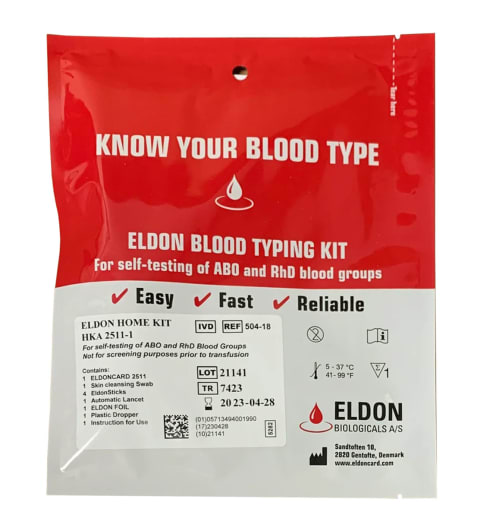Includes everything you need to find your blood type: an Eldon card, alcohol prep pad, blood lancet, plastic syringe, special comb, and an instruction and quiz pamphlet.
Blood Typing Kit (individual test)
Description
A simple finger-prick blood typing kit. Enough materials for one test. For educational purposes only.
Do you know your own blood type? Do you know your children's blood type?
The EldonCard blood typing test kit is also excellent for classroom instruction and other educational applications.
One foil sealed 2511-1 ABO-Rh Eldoncard test card for 1 blood type determination.
1 each Alcohol prep pad, 4 each EldonStick blood transfer Devices, 1 each plastic pipette, 1 each clear plastic laminating sheet to permanently preserve test results, 2 each automatic safety lancet devices to eliminate the frequent problem of user premature triggering and a comprehensive user instruction manual with blood type interpretation chart.
Newly revised and co-authored by Marilyn Shannon and Rachael Yunis, this anatomy and physiology course continues the exceptional teaching we have come to expect from Apologia. Solidly college-prep, this course combined with the Exploring Creation with Biology, is equivalent to one full year of college Biology and will familiarize students with AP or CLEP exam content. Prerequisites to this academically rigorous course are one year of high school Biology and one year of high school Chemistry.
The softcover student text is comprised of sixteen modules (chapters). Each module is designed to be completed within 2 weeks, meaning the course could be completed in 32 weeks; however, you may want to allow extra time to complete some modules. The built-in flexibility of the program allows for students who need more time to assimilate the teaching to still complete it within one school year.
The first module provides an organizational overview of the human body and homeostasis, as well as a general review of concepts such as cell structure, protein synthesis, and cellular mitosis. Subsequent modules study histology (study of tissues), integumentary and skeletal systems, skeletal system histology and movement, muscular system histology and physiology, skeletal muscle system, nervous system, central nervous system, peripheral nervous system, endocrine system, cardiovascular system, lymphatic system, digestive system, respiratory system, urinary system and the reproductive system. Featured throughout each module are "On Your Own" study questions to help students assess comprehension of the subject matter. Each module contains a comprehensive Study Guide to prepare students for module tests. Sprinkled throughout the 2nd edition are "Think about This" and "Heart of the Matter" segments to direct student focus to familiar experiences and Christian worldview/scripture verses (NIV and NLT). An additional benefit of the Apologia courses is the experiments, which have three types in this course: microscopic labs, dissection labs and household labs. References to coloring exercises from the Kaplan Anatomy Coloring Book (#000258) are incorporated (although the coloring book has been updated and the page numbers are different. Parents/Students will find it fairly easy to match the lessons to coloring pages. Apologia has updated their website and currently state, "As there are many good options for a student to choose from, we have decided to let the student and/or instructor pick the anatomy coloring book that best fits their needs. Many anatomy coloring books cover the same basic human body functions and the process of coloring."
The Solutions and Tests booklet contains anywhere from 7 to 20 test questions for each module, answers to the test questions, and solutions to the Study Guide questions.
There are a few differences between the 1st and 2nd editions. In the 2nd edition, you will find a Welcome Letter which incorporates Scripture references. The initial chapters in the 2nd edition appear less "chatty" than the 1st edition text. The textual information is similar (and much is the same) although a few sections have been expanded and clarified. Many of the "On Your Own," Study Guide and Test questions are the same. A negligible number of questions have been reworded. The 2nd edition also contains a link to a website with web-based support materials arranged by module (password included). Lab experiments appear to be mostly the same; although changes have been made in the Fetal Pig Dissection. While the 1st edition listed several websites and books as resources to walk the student through the dissection, the 2nd edition provides only six general overview steps with no additional support resources listed. For a more thorough dissection experience, we would recommend supplementing with the Photo Manual Dissection Guide: Fetal Pig (#28523) or How to Dissect (#45220). Most of the changes to the 2nd edition are found in the formatting, including text color and font type. Lab experiments are now in a contemporary font overlaid on graph paper. Other format changes include more colorful fonts and some improved graphics. Colored Tabs at the side of each page reflect the current module.
With this course, your student is sure to experience an excellent, homeschool-friendly Anatomy and Physiology course that will prepare him or her for college success. Speaking from experience, my daughter completed this course during her high school at home and graduated with her Bachelors degree in nursing four years later. She unwaveringly affirms her appreciation for the Apologia science courses in giving her success at the college level. ~ Deanne
| Product Format: | Other |
|---|---|
| Grades: | 9-AD |
| Brand: | Nature's Workshop |
| EAN/UPC: | 5707698120007 |
| Length in Inches: | 7 |
| Width in Inches: | 5.875 |
| Height in Inches: | 0.5 |
| Weight in Pounds: | 0.05 |

